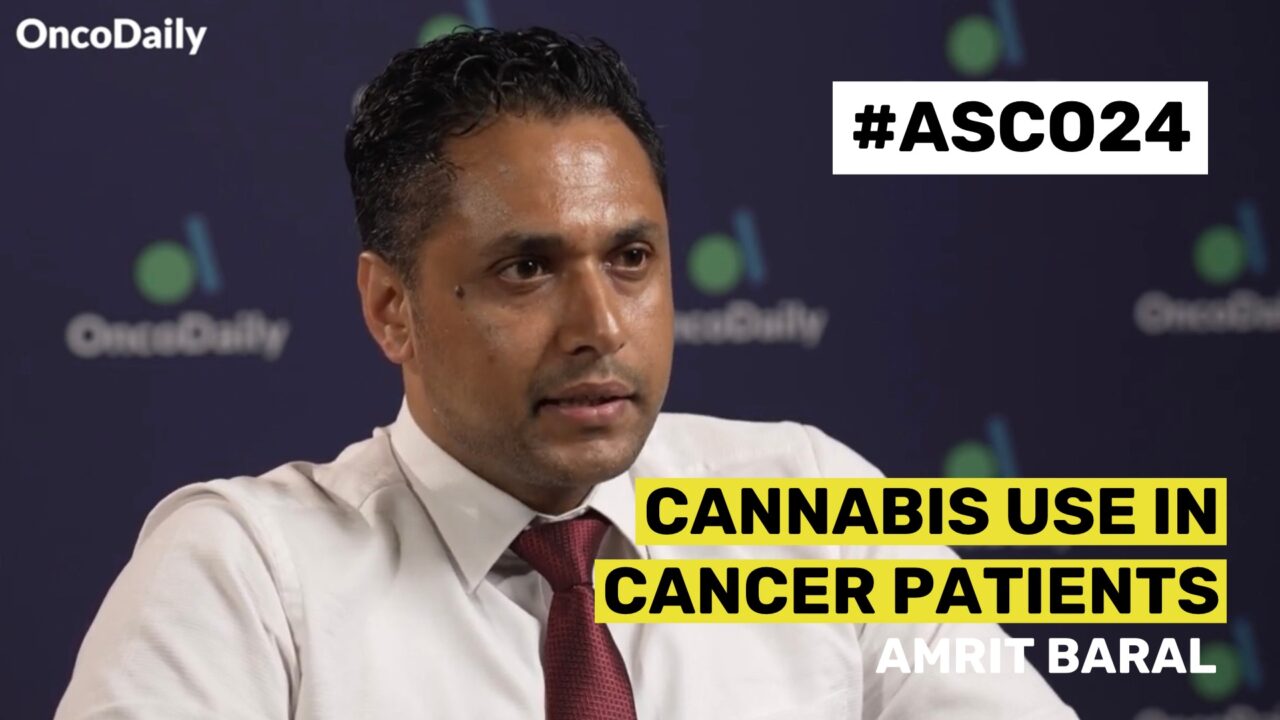The American Society of Clinical Oncology (ASCO) Annual Meeting is one of the largest and most prestigious conferences in the field of oncology. This year, the meeting took place from May 31 to June 4 in Chicago, Illinois. The event gathers oncologists, researchers, and healthcare professionals from around the world to discuss the latest advancements in cancer research, treatment, and patient care. Keynote sessions, research presentations, and panel discussions are typically part of the agenda, providing attendees with valuable insights into emerging trends and innovations in oncology.
This year, OncoDaily was at ASCO 2024 for the first time covering the meeting on-site. We had the pleasure of interviewing researchers who summarized the highlights of their work.
In this video, Amrit Baral, a PhD candidate in epidemiology at the University of Miami, shares insights on ‘Experience of young patients with cancer discussing cannabis with their providers.‘
Hi, my name is Amrit. I’m with the University of Miami. I’m doing my PhD in epidemiology.
My research focuses around the biophysiological, societal, and behavioral effects of cannabis and psychedelics in cancer patients. And so this is my first time attending ASCO and I was able to present some findings from a study that we recently conducted. The study was funded by National Cancer Institute, where we were looking at studying the different patterns of cannabis use among cancer patients at Sylvester Comprehensive Cancer Center at the University of Miami.
And in this particular analysis that I was able to present here at ASCO, we looked at the communications between the cancer care provider and the cancer patient about discussing cannabis in the oncology setting. And we analyzed the data from 495 participants. However, for this particular analysis, we only analyzed 226 cancer patients who reported use of cannabis in the recent cannabis use, that is the cannabis use in the past 30 days.
So what we found interesting was we asked these questions on whether they were comfortable discussing their cannabis with their providers and also have they ever disclosed their use of cannabis during their treatment or follow-up with the cancer care provider in the center. So what we found interesting was the younger age groups between 20 to 39, 43% reported that their cancer provider, their oncologist, they don’t know about their use of cannabis. And we also found on the same age group that around 45% of these 20 to 39 years old cancer patients, they were reluctant to disclose their use of cannabis to their providers.
So that brings us to the current situation where the laws around cannabis are evolving at a global scale. And also cannabis use is getting popular in the oncology setting, especially among cancer patients, to manage their symptoms of nausea, vomiting, anxiety, headache, pain, etc. However, there is a huge gap in the communication between the providers, the cancer care providers, and the patients.
And that brings us to a number of hypotheses that there could be drug interactions, there could be interaction between antineoplastic drugs and cannabis, that there could be other factors that come into the play if the patient do not disclose their cannabis use to the provider. So given that the popularity of cannabis use in this patient population, and also there are a lot of studies that have reported that actually these cannabis compounds or the cannabis they consume for alleviating pain, headache, nausea, vomiting, that have actually worked in the cancer patients. However, we still need a lot of evidence so that we can bring this topic, especially to the providers as well as the patients.
And so what we’re trying to do at the University of Miami, our subsequent study that we are launching very soon, we are actually going to analyze, we’re going to actually collect the data on what are the barriers and opportunities of discussing this substance like cannabis in the oncology setting. So we are going to conduct a survey with the cancer patients about their discomfort, how can we make the conversation easy, what should be done in terms of them discussing cannabis with the providers or reducing the stigma and things like that.
But also with the providers, because there is a two-way dynamics here that we’re talking, also we want to understand from the provider side that what are the barriers and what are the opportunities.
For instance, they might need a proper guideline, they are hesitant to discuss cannabis because of the stigma, or also we want to understand the socio-demographic differences among providers as well as the cancer patients regarding the discussion of cannabis in the oncology setting. So I think it’s a very important topic because a lot of countries are in the path of legalizing cannabis for medicinal use, and also we can see that there is a lot of normalizations regarding its use. So more cancer patients, especially the young cancer patients are going to use cannabis to manage a lot of symptoms.
So given that, this research is very important and I was a little surprised that I didn’t see a lot of research about cannabis in ASCO, it was my first time. And I hope we will be able to collaborate with the oncologists, epidemiologists and other stakeholders in order to bring this topic into a next level where we could find out what exactly is the role of cannabis in cancer therapy, from symptom management to drug interactions to the effects with other treatments. And I would like to thank you for inviting me in this session.
More videos and content from ASCO 2024 on OncoDaily.


